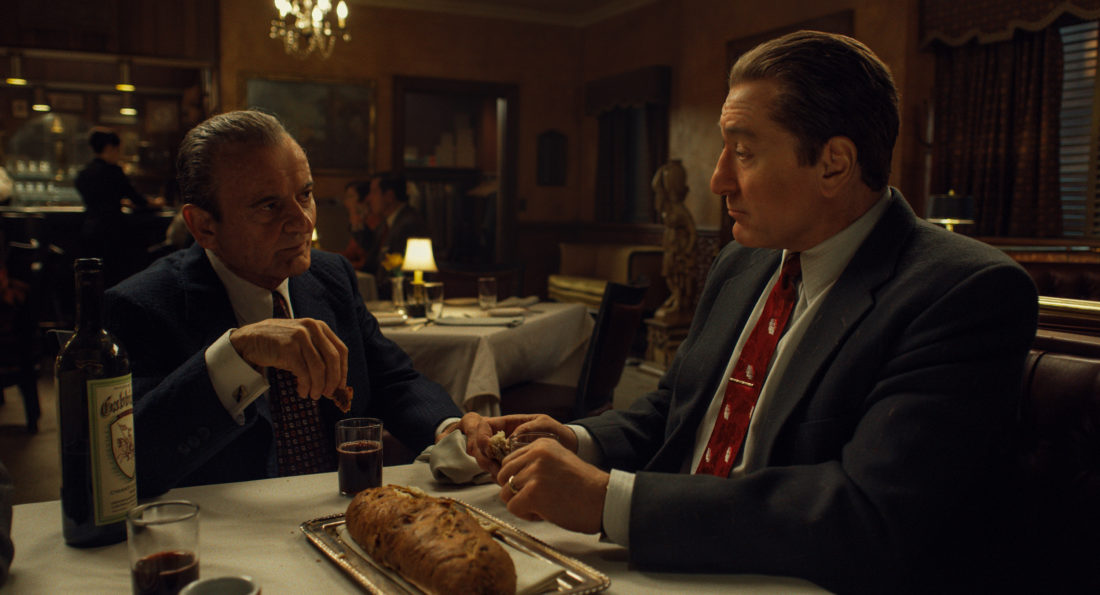Martin Scorsese’s The Irishman probably doesn’t need to be 3 1/2 hours long, but that’s focusing on the wrong thing. The story of someone’s life takes time to properly tell and isn’t just made up of grand moments. The little, quieter ones lead up to the defining events of a person’s existence and are when relationships are often formed, some of which can forever change a person’s world.
What’s important to Scorsese is allowing the necessary minutes for his characters to develop and inherent tensions in the story to build. When Frank Sheeran (Robert De Niro) is introduced, he’s a small-time crook supplementing a working-class income by sneaking meat deliveries to a mob establishment for a better cut of profits. His delivery routes eventually lead to an encounter with Russell Bufalino (Joe Pesci), a mob capo who sees Sheeran’s resourcefulness as ideal for a subordinate who will do anything asked of him.
From there, the narrative becomes an origin story for a successful gangster, one who could fit right into previous Scorsese mob epics like Goodfellas. Sheeran becomes a loyal soldier for Bufalino, picking up payments, beating up anybody who doesn’t show proper gratitude and killing those who pose a threat or fail to realize their proper roles in the entire operation.
However, the key difference in this story is that Scorsese’s protagonist intersects directly with historical events that have been a mystery to the population at large for more than 40 years. Moving up in the organization eventually gets Sheeran tapped to help out union boss Jimmy Hoffa (Al Pacino) in a dispute with Chicago cab drivers. Sheeran becomes Hoffa’s trusted accomplice and family friend, a fateful development that tests the gangster’s loyalties to their limit.
The Irishman spans more than 50 years, and going deep into Sheeran’s past requires digital effects to de-age De Niro. It’s distracting at first when De Niro’s younger face doesn’t quite look real. But more often than not, the effect is startlingly effective, showing us a De Niro we haven’t seen for decades. However, the true achievement is De Niro’s performance, the best work he’s done in many years. Sheeran is torn between friends (and family) and those who provide him a life he never could have imagined, and De Niro makes that emotional pain palpable.
But perhaps the greatest acting surprise is Pesci, more reserved and quietly powerful than he’s ever been. (Pacino gets all the histrionics, portraying Hoffa’s outsized, bombastic personality.) Russell doesn’t bend people to his will by yelling, punching people or smashing things. He simply wields the fear of what happens to those who cross him or don’t show respect.
We’re fortunate in Asheville to have The Irishman shown on the big screen, the ideal environment in which to watch this film. Yes, 3 1/2 hours is a considerable commitment, and maybe you’ll appreciate being able to take breaks at home while watching the film on Netflix. But the world Scorsese evokes — through music, costuming, food and history — and the performances from his powerhouse ensemble (the scenes between De Niro and Pacino warrant the hype) pull you in and make that time go by mostly unnoticed.
Afterward, perhaps you’ll think about what seemed unnecessary or went on too long, but you likely won’t feel that way while watching and appreciating every moment The Irishman provides.
Now playing at Grail Moviehouse




Before you comment
The comments section is here to provide a platform for civil dialogue on the issues we face together as a local community. Xpress is committed to offering this platform for all voices, but when the tone of the discussion gets nasty or strays off topic, we believe many people choose not to participate. Xpress editors are determined to moderate comments to ensure a constructive interchange is maintained. All comments judged not to be in keeping with the spirit of civil discourse will be removed and repeat violators will be banned. See here for our terms of service. Thank you for being part of this effort to promote respectful discussion.